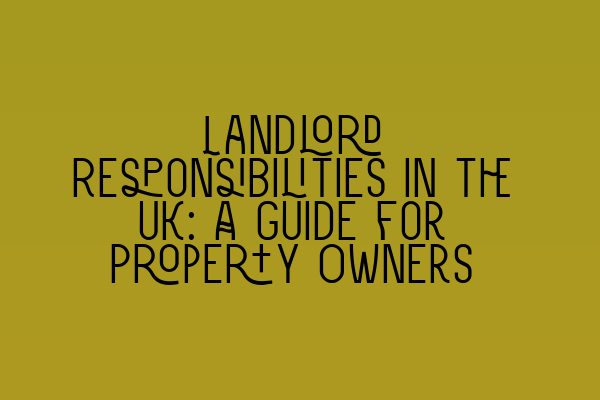**Landlord Responsibilities in the UK: A Guide for Property Owners**
As a property owner in the UK, it is crucial to understand your responsibilities as a landlord. Ensuring that you meet your obligations not only protects your investment but also establishes a positive and healthy relationship with your tenants. In this comprehensive guide, we will walk you through the key landlord responsibilities you should be aware of.
1. **Health and Safety Obligations**
First and foremost, landlords have a legal duty to provide a safe and healthy living environment for their tenants. This includes ensuring that the property meets all the necessary health and safety standards. From gas and electrical safety to fire safety and the provision of clean water, it is imperative to adhere to all relevant regulations. Regular inspections and maintenance checks can help identify and address potential hazards.
2. **Repairs and Maintenance**
Another important responsibility of landlords is to maintain the property in good condition. This includes conducting necessary repairs promptly, such as fixing broken appliances, leaky faucets, or faulty wiring. Keeping the property well-maintained not only ensures the comfort and satisfaction of your tenants but also helps preserve the value of your investment.
3. **Tenancy Agreements**
Drafting a comprehensive and legally binding tenancy agreement is essential. The tenancy agreement outlines the rights and responsibilities of both the landlord and the tenant, including details about rent, deposit, and the length of the tenancy. It is crucial to ensure that the agreement complies with the relevant legislation and covers all necessary clauses, such as rent review, termination, and dispute resolution procedures.
4. **Deposit Protection**
When renting out a property, landlords are required to protect their tenants’ deposit in a government-approved tenancy deposit scheme (TDP). This protects the tenant’s deposit and helps to prevent disputes at the end of the tenancy. It is important to provide tenants with the prescribed information about the scheme within the designated timeframe. Failure to do so can result in penalties.
5. **Right to Rent Checks**
Under UK law, landlords are obligated to conduct right to rent checks on their tenants to ensure they have the legal right to reside in the country. These checks must be carried out before the tenancy agreement is signed with appropriate legal documents as evidence of the tenant’s immigration status. Failing to carry out these checks can have serious consequences for landlords, including fines and penalties.
6. **Energy Performance Certificates (EPCs)**
An Energy Performance Certificate (EPC) is a legal requirement for rental properties. It provides information about the energy efficiency and environmental impact of the property. Landlords must ensure that their property has a valid EPC with a minimum energy efficiency rating. The certificate should be provided to tenants prior to the start of the tenancy.
7. **Insurance**
While not a legal requirement, it is highly recommended for landlords to have suitable insurance coverage for their rental properties. Landlord insurance can protect against potential risks, such as damage to the property, loss of rental income, or liability claims. It is important to review and understand the terms and conditions of the insurance policy to ensure it covers all relevant aspects.
8. **Resolving Disputes**
In the event of a dispute between landlord and tenant, it is important to handle the situation promptly and professionally. Communication is key to resolving conflicts, and it is advisable to try and reach a mutually acceptable resolution before resorting to legal proceedings. If necessary, seeking legal advice and utilizing mediation services can help facilitate a fair resolution.
In conclusion, being a responsible landlord involves meeting various obligations to ensure the well-being of your tenants and the preservation of your property investment. Familiarizing yourself with these responsibilities and staying up-to-date with the relevant legislation is vital. By upholding high standards and maintaining good relationships with your tenants, you can create a positive rental experience for all parties involved.
For more information on the SQE exams and professional development for property law and land law, check out the following related articles:
– [SQE 1 Practice Exam Questions](https://fqps.co.uk/sqe/sqe1-preparation/mcq-practice-quiz)
– [SQE 1 Practice Mocks FLK1 FLK2](https://fqps.co.uk/sqe/sqe1-preparation/practice-mocks-quiz)
– [SQE 2 Preparation Courses](https://fqps.co.uk/sqe/sqe2-preparation)
– [SQE 1 Preparation Courses](https://fqps.co.uk/sqe/sqe1-preparation)
– [SRA SQE Exam Dates](https://fqps.co.uk/sqe/sqe1-sqe2-exam-dates)
If you have any further questions or require legal assistance, do not hesitate to contact SQE Property Law & Land Law, where our team of experts can provide you with professional guidance tailored to your specific needs.
